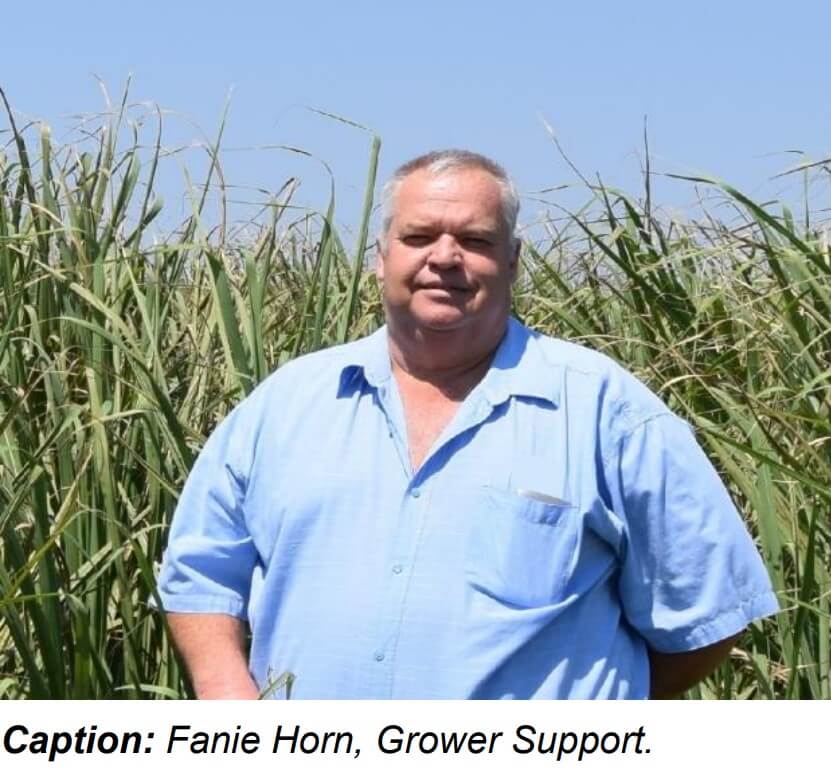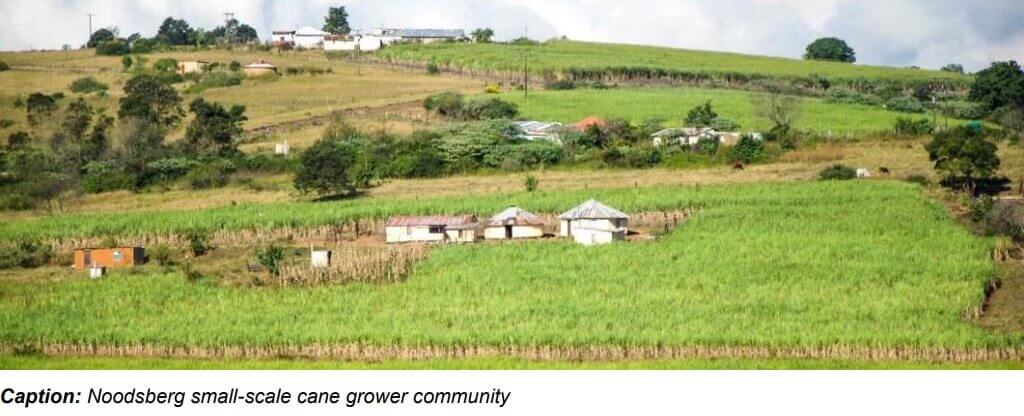Innovating to empower small-scale growers to change livelihoods and create jobs
After over 30 years working in agriculture at Illovo Sugar South Africa, Fanie is still as passionate about empowering small-scale growers today, as he’s ever been. He and his team of grower support officers are making a significant impact in our Noodsberg cane supply area, empowering small-scale growers to change livelihoods and create economic opportunities for themselves and their communities.
We caught up with Fanie as part of our series of “people stories” and chatted to him about his team’s response to how COVID-19 has impacted the way in which they carry out their work. We were also keen to find out where his three-decade long passion for agriculture comes from, what support their office provides to local growers, and how the global pandemic has shaped grower engagement innovations.
Let’s start back at the beginning. Have you always wanted to work outdoors or in agriculture?
“Yes, agriculture has always been my passion. Growing up I loved to spend time on the farm with friends; we’d camp overnight and fish. Even back then, I’d dream of working in an agricultural business when I was older. As I grew up, I realised the value of achieving a professional qualification and soon set about working towards becoming qualified as a motor vehicle technician. Achieving this enabled me to secure my first role after a five-year apprenticeship as a maintenance officer at our Sezela sugar mill on the south coast. The rest, as they say, is history!”

Can you tell us a bit about your career journey?
“I joined Illovo in the early 1980s and have worked in a number of different roles since, from maintenance to farm manager and cane supply to grower support. Each opportunity has allowed me to develop a greater understanding and appreciation for our growers. This has fuelled my passion to ensure our growers receive the support and engagement they need. I started working directly with small-scale growers in the mid-90s where I saw first-hand the impact that we can have as an agriculture team in the local community. It was through these experiences that I ‘found my calling’ and knew that supporting small-scale growers was what I wanted to do full-time for my career. I’ve been privileged to be able to pursue that passion ever since.”
You’ve been in your role at Noodsberg for eight years now, how has the relationship between the team and local growers changed during that time?
“The growers are always at the heart of everything we do as a team - and we can see the rewards of this approach in the strength and depth of the relationships that we have developed with them. As a team, we have spent a great deal of time earning the trust of the community and the community leaders; we listen, and we work together for the benefit of all. Our communities can see this and understand the opportunities that working together can bring not only for themselves, but for everyone.
We host regular training sessions with our growers and contractors, as well as field days to get out and see those that may not be able to make it to the training. The development is not one-way though. As a team, we have developed too and learnt new ways and approaches to engage with our larger-scale growers to get shared value from our mutual relationships. Our aim is to empower local growers, and in doing so, we are able to change livelihoods and create jobs as the payment for the sugar cane goes directly back into the community. This supports the building of new houses and sending children from the villages off to school and university. This is where the true impact lies.
Picking up on the pandemic, how has this impacted your team’s work?
“It’s had a huge impact, but we’ve seen both positives and negatives. While using technology to connect with our grower base has been one of the biggest growth areas over the past eight years, it has accelerated during the coronavirus pandemic. We have seen a significant shift in our ‘ways of work’ in that we have had to move from the in-person interactions we value so much, to a more consistently online or digital form of communication. This is due to the various lockdown restrictions in place to protect us and our grower communities.

Many growers have been asking when we will be coming to visit again as we’re all missing the physical conversation and engagement face-to-face. I believe this demonstrates the strength of our relationships and the trust that they place in our support team, however everyone appreciates that the restrictions are necessary to prioritise health and safety. The good news is we have been able to fast track the adoption of digitalisation and technology amongst our grower base, which I believe would have taken longer had we not been dealing with a global pandemic.
We have set up WhatsApp groups for the community leaders as well as growers. We interact with them and send information through the channel. It has meant upskilling some of the growers in digital technology, but it’s been a valuable way to keep in touch and is something that we will continue to utilise even when the restrictions are reduced, and we can meet face-to-face again.”
Where are you looking to next and how do you see the development of support services in your local area?
“We want to get back to in-person training sessions and knowledge transfer field days with our grower as soon as we can, nothing beats connecting face-to-face. We have a saying here: ‘grow the grower to grow the cane’ and I think this demonstrates how everything we do as a team in Noodsberg and Sezela comes back to the grower as the focal point. It’s a real honour for me to lead such a passionate team, to see the impact that we are having locally, and to think about what else we can do to support our growers.
It’s also important for me to feel like we’re inspiring the next generation. We work with the local agricultural college and their first-year students to demonstrate what working in the industry is like - and the opportunities that come with it - to hopefully inspire them to stay within their community and farm sugar cane too.
I believe that the saying ‘You’re never too old to learn’ provides real words to live by. Learn as much as you can but don’t keep it to yourself, share it around.’ This is what I try to bring to my team and my role every day. A deep passion runs within me to support those around me. I hope that by doing so, I can inspire future generations to not only consider the sugar industry for their careers, but the wider agricultural industry too.”